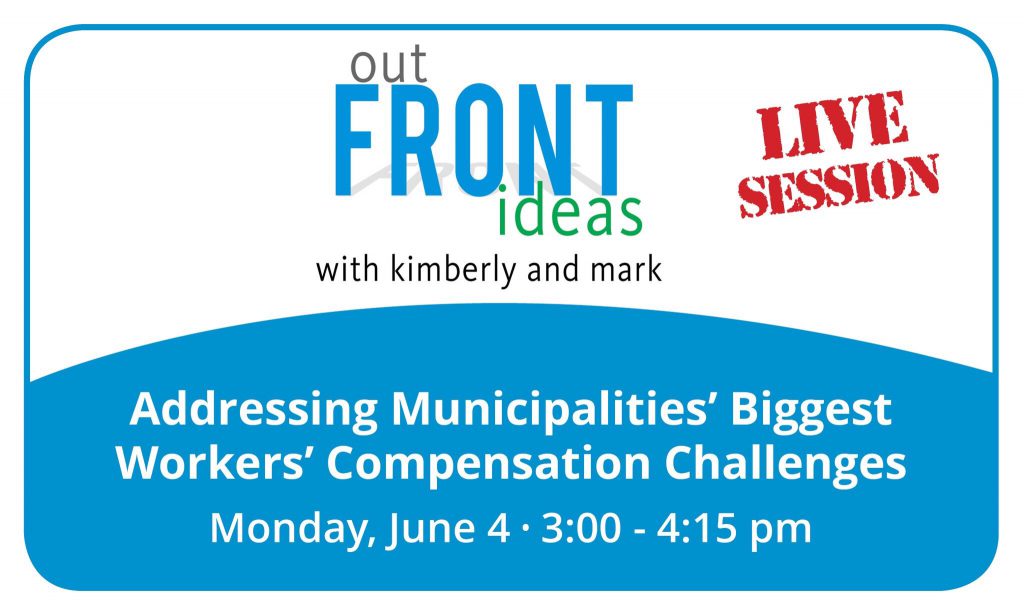Addressing Municipalities Biggest Workers’ Compensation Challenges
This live edition of “Out Front Ideas” at PRIMA’s 2018 Annual Conference featured a panel of public entity risk managers discussing their biggest workers’ compensation challenges and how they are overcoming them.
Panelists included:
- Mark Walls – VP of Communications and Strategic Analysis – Safety National
- Kimberly George – Senior VP of Corporate Development, M&A and Healthcare – Sedgwick
- Sarah Perry – Risk Manager – City of Columbia, MO
- Betty Coulter – Director of Risk Management and Insurance – University of North Carolina
- Chris Hills – Risk Manager – City of Kent, WA
- Mark Barta – Assistant Director of Risk Management – City of Fort Worth, TX
The panel began discussing presumptive illness, focusing on fire cancer claims as a large challenge for their municipalities. The first obstacle being a general distrust of risk management evaluation and potential negative PR attention, it was suggested that cross-departmental/union dialogue was critical. Establishing a consistent protocol in handling cases, ensuring a case manager is the advocate for the employee, and engaging an M.D as a consultant who determines eligibility rather than risk management were suggestions on improving the credibility and trust of the process overall. Mark Barta shared his city’s effort to establish a medical network of local cancer experts that were direct referrals was well received as providing the best medical care for their employees.
With an increase of visibility in mass casualty incidents, there was a brief discussion on PTSD presumption with session attendees. The consensus overall was a call to pay attention as legislation is updated, advocating for sensibility in the language of coverage requirements. Currently PTSD claims from mass casualty incidents are frequently denied for first responders as those are not considered unreasonable on the job scenarios.
With 1 in 3 Americans suffering from some level of mental illness, it’s critical to risk managers to make mental health awareness and treatment a priority in their policies. The significant occurrence can be found in review of medications being prescribed to employees and identifies its prevalence in all employees, not just in higher stress positions. Panelist shared that their biggest challenge is the lack of providers with workers’ compensation experience in this area so it is important to have dialogue with physician partners about expectations. Internally, it is important to break down the stigma in the community and there are free online resources available including mental health first aid which helps with peer identification, and stamp out stigma. To help establish policy and support for mental health treatment, DMEC (Disability Management Employer Coalition) is a good resource for building a business case, solutions, and outcome goals. Betty Coulter shared that setting up a program that educated at risk/predisposed employees with affects of mental health (in addition to other predisposed illnesses) on overall healthcare and impact on day to day activities and providing resources improved overall workforce health.
Return to Work was the next discussed challenge with a couple of solutions suggested by the panel. Each panelist discussed strategies on transitional positions and the challenges of cross-departmental and even cross-union realities. Establishing policies on providing comparable roles, regardless of department, is critical to full return to work and limiting lost time. The injury incurred department should be responsible for payment of the comparable role as necessary. Sarah Perry suggested establishing permanent transitional jobs that can be used short term for RTW employees in an effort to ensure fully funded positions are available. Workers’ comp recipients can be assigned as needed, but the positions could also be applied for through HR by other accommodation needs employees. Mark Barta suggested a budget accountability program to limit lost time and transition time. An interactive process resource is available online: askjan.org
The final topic was opioids and their continued affect. The panelist agreed in general that in workers compensation perspective, it’s largely controlled through provider relationships and holding them accountable for responsible treatment. The challenges are mostly from personal health providers. Suggestions on mitigating were to involve EAP program and drug testing, establishing a pre-pain plan and education, mindfulness in treating acute pain vs. chronic pain, and monitoring post treatment patterns to provide additional support and resources if necessary.


